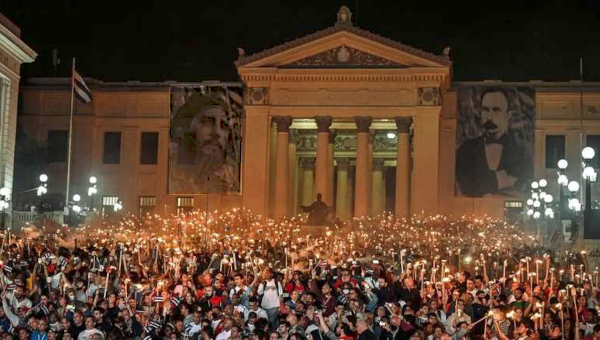For reports of resistance as well as details of those detained, murdered and disappeared, in English, go to Revolutionary Road ... and to Iranian.com.
Return to Law Or Create New Laws?
Amir K.
Khiaban # 26 / Saturday, July 18, 2009
Yesterday, the city [of Tehran's] streets belonged to the people once again. Rafsanjani's leading of the Friday prayer [at Tehran University] became an excuse for mass gatherings and demonstrations in the city. On route to and from the Tehran University, from the early morning till long after dark, Tehran's streets were witness to huge and united crowds, who had opened a way through the shields and the truncheons, and filled the hot summer air with their slogans.
It is now more than a month that the streets have become the most important arena for struggle, changing hands in turns between the dissenting people and, on the other hand, the oppressive forces of the regime. At times, the people take back the control of the streets, at other times death squads have established their reign over the streets. The system knows that, to consolidate a new era of sinister rule, it must control the streets just like before the electoral coup; and the people too know that, in order to put an end to decades of tyranny, discrimination and inequality, they must make the city streets their own. The end result of this fateful fight will determine the people's future life. So, it is not without reason that the people, holding their heads high and ready for death, with steadfast steps and smiling lips, are confronting the darkest and the bloodiest regime of the era. The rhythms of the accelerated waves of their movement has compacted their social history, and the seeds of their hopes and anticipations in mere moments have already turned into healthy saplings standing tall.
In the Friday prayer sermon [of July 17th], Rafsanjani did not stand with the organizers of the coup. But, did he stand with the people? His suggested solution was to return to law. This demand, however, has no relation to the current demands of the people. Interesting how the fundamentalists too invite the reformists to submit to the law, and claim that Mousavi and his cohorts refuse to accept the legal institutions (particularly the Interior Ministry and the Guardian Council).
The truth is that the people, as a result of the experience of their glorious confrontation against the coup, have discovered that countless existing laws are in contradiction with a just and dignified life. In the very widespread presence of the people in the streets yesterday, once again vast numbers of people were subject to beatings, large-scale arrests, and reports of guns firing [at people] have been published. People are being oppressed by institutions, which gain their legitimacy from the existing laws. For the people, the opportunity for public assembly to dissent and protest is a right, and they are furious over the violent answer of the regime to dissent. Some have even come to the protests with placards displaying parts of an article of the constitution guaranteeing the freedom of assembly and peaceful demonstration by any group. However, these placards usually skip the rest of this article, which clarifies: "Unless it is against Islamic principles." And by reading the constitution more carefully, we see that according to the existing laws, in effect the regime has the option to decide which assemblies are against the [Islamic] principles and which ones are not.
As a result, when the murderous coup regime speaks of the illegality of the recent demonstrations, they are not far off the mark. For the current laws sanction a small minority, hovering above the people and beyond their oversight, to [legally] crush any opponents. However, although the behavior of the coup regime may even have a standing on the basis of the current national legal system, it has become clear for everyone that these laws are not based on justice, but are simply tools at the service of injustice and brutality against the society.
The people have entered the arena to reclaim their rights, and if there exists contradictions between the laws and the social rights [of the people], people are demanding the laws to be changed and want to create new laws that recognize and protect their rights. 'Returning to law', from the people's point of view, is nothing but a return to 30-year old subjugation. People have taken to the streets in order to create free political spaces. They are fighting for the creation of new social laws. And this goal cannot be achieved but through the destruction of an oppressive and anti-human legal system, and the creation of a new set of laws based on citizens' rights, freedom and social justice.







No comments:
Post a Comment